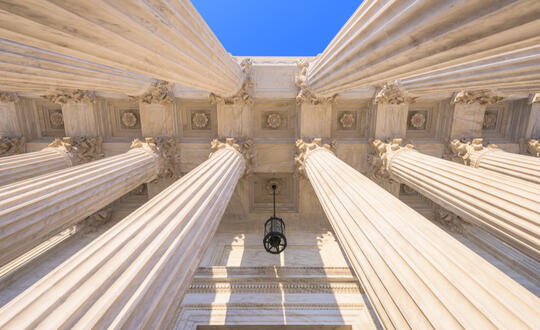U.S. Supreme Court Denies Certiorari Review in FCRA Sovereign Immunity Case, Cementing Circuit Split
Apr 22 2020
On Monday, the United States Supreme Court denied certiorari review of a Fourth Circuit Court of Appeals decision[1] that the federal government is immune from civil liability for claims brought under the Fair Credit Reporting Act – leaving open a divide amongst the circuit courts on the issue of federal sovereign immunity under FCRA.
In the underlying suit, petitioner Anthony Robinson alleged that he was the victim of identity theft. He claimed that as a result of the theft, a U.S. Department of Education loan was fraudulently obtained in his name. After Robinson unsuccessfully sought to remove the loan from his credit history, he sued the Department of Education for monetary damages under FCRA.
Under FCRA, any “person” who willfully or negligently fails to comply with the statute’s civil enforcement provisions is liable to the consumer for the greater of actual damages or statutory damages of $1,000. The statute defines “person” to include “any … government or governmental subdivision or agency.” 15 U.S.C. §1681a(b).
The Department of Education moved to dismiss Robinson’s complaint on the basis of federal sovereign immunity, arguing that the federal government was not included in FCRA’s definition of “person.” The United States District Court for the District of Maryland granted the motion and in March 2019, the Fourth Circuit affirmed the District Court’s dismissal.
The Fourth Circuit concluded that, despite the statutory language, it could plausibly read “person” to exclude the federal government. The Fourth Circuit reasoned that if it adopted the opposite interpretation, that interpretation could lead to incorrect results in the enforcement of other FCRA provisions (e.g., responsibility under FCRA for federal criminal charges).
Further, the Fourth Circuit compared the language in the specific waiver provisions – e.g., a provision that makes the United States liable to a consumer for damages when it unlawfully discloses the consumer’s credit information with the FBI – with the general definition of “person” in the broader civil enforcement provisions. It held that the broad definition does not waive the federal government’s sovereign immunity noting that to adopt Robinson’s reading of the statute would “render superfluous” those narrower waivers of sovereign immunity in the FCRA’s specific civil enforcement provisions.
United States Supreme Court Justice Thomas penned a dissent to the cert denial, which Justice Kavanaugh joined, noting that the case warranted review because the question presented in Robinson’s petition divided the Circuit Courts and “concerns a matter of great importance.”
Justice Thomas recognized that while the Ninth Circuit has adopted the same stance[2] as that expressed by the Fourth Circuit, the Seventh Circuit takes the opposite stance[3] – the Seventh Circuit holding that sovereign immunity is waived under its broader interpretation of the definition of “person.” Justice Thomas warned that if the federal government is stripped of sovereign immunity without a clear statutory mandate, there could be a boon of private suits for monetary damages against the United States that would place “unwarranted strain” on the federal government’s ability to govern.
Further, he cautioned, as the primary student loan lender in the United States, the Department of Education is one of the largest furnishers of consumer credit data in the country and its potential liability under FCRA is substantial.
Without a resolution from the Supreme Court, the Courts of Appeal remain in conflict. As a result, Justice Thomas noted, “borrowers of federal loans in Illinois, Indiana, and Wisconsin have access to a cause of action against the Federal Government while borrowers with the same types of loans in 14 other States [Alaska, Washington, Oregon, California, Hawaii, Montana, Idaho, Nevada, Arizona, Maryland, West Virginia, Virginia, North Carolina, South Carolina and the territories of Guam and the Northern Mariana Islands] are barred from suit.”
[1] Robinson v. United States Dep’t of Educ., 917 F.3d 799 (4th Cir. 2019), cert. denied 590 U. S. ____ (U.S. April 20, 2020)(19-512)
[2] Daniel v. Nat'l Park Serv., 891 F.3d 762 (9th Cir. 2018)
[3] Bormes v. United States, 759 F.3d 793 (7th Cir. 2014)